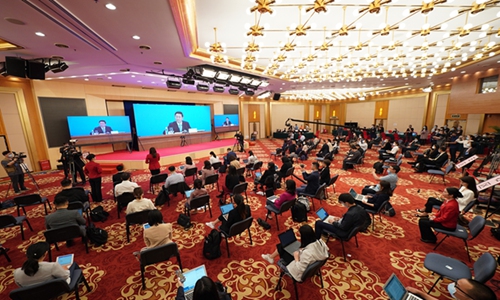Proposal to end translations at major press conferences raises feasibility issues
By Dong Feng Source:Globaltimes.cn Published: 2020/5/29 4:22:19

The third session of the 13th National Committee of the Chinese People’s Political Consultative Conference (CPPCC) holds a press conference in Beijing on May 20, 2020. Photo: VCG
A deputy to the National People's Congress (NPC) proposed on Wednesday the idea of canceling language translations in all major press conferences on the Chinese mainland, which aroused discussions among Chinese netizens.
Yang Weiguo, mayor of Zhuzhou, Central China's Hunan Province, suggested the move might be conducive in four aspects, including enhancing the influence of Chinese as a language and improving communication.
To check feasibility, the Global Times reporter talked to several foreign journalists in Beijing.
Documentary filmmaker Suvam Pal, a Beijing-based author and media professional, said that it is "very normal that the Chinese legislator would suggest that all press conferences should be in Chinese."
"I don't see any issues with that, moreover, for any journalist who is working in China, it is mandatory to learn Chinese," Pal said.
During Chinese Premier Li Keqiang's media briefing after the conclusion of the third session of the 13th National People's Congress in Beijing on Thursday, NBC asked questions in English, while Singaporean and Japanese media posed their questions in Chinese.
The press conference was equipped with interactive language interpretation.
A Beijing-based South Asian journalist who requested anonymity, told the Global Times that it would be certainly feasible to hold news conferences only in Chinese. However, if a foreign journalist who can't speak, read, or write Chinese, he would be extremely limited or inconvenienced on reporting about an event where only Chinese is used.
The proposal by Yang reasoned that China is a permanent member of the United Nations, and Chinese is one of the official languages.
Among the five permanent members, besides China, France and Russia are countries that do not use English as their working language.
Their press conferences are equipped with bilingual capabilities that allow for simultaneous interpretation when a spokesperson speaks in their native language.
In Japan, the majority of the press conferences are in Japanese but include subtitles.
In Korea, depending on the occasion, some officials speak Korean with English, and will feature Korean and English subtitles, while sessions for media briefings on the novel coronavirus, the spokesperson used English with bilingual subtitles.
China's Foreign Ministry's routine press conference features a bilingual system, and journalists are provided with simultaneous interpretation via earphones.
It is not clear how Yang's proposal might be processed.
The proposal itself has become one of the hot topics at Sina Weibo.
As of press time, the proposal has been read almost 780,000 times.
Some netizens hardly find it valuable, arguing that NPC deputies are supposed to care more about the livelihood of people instead of worrying about the government communication system.
However, some netizens favor the proposal, citing reciprocity ideals.
Many netizens said it was necessary to provide accurate translations so events would be understood better.
Posted in: SOCIETY